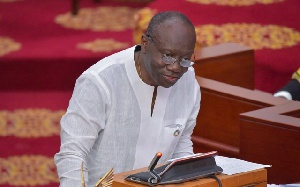 Finance Minister, Mr Ken Ofori-Atta
Finance Minister, Mr Ken Ofori-Atta
Agenda 2030 for Sustainable Development shall address the three interconnected elements of sustainable development; economic development, social inclusion and environmental sustainability.
Mr Ken Ofori Atta, Minister of Finance and Economic Planning, who announced this during the presentation of the 2019 Budget Statement in Accra, said this calls for deliberate steps to ensure that Ghana would be fully Agenda 2030 compliant, leading to the accelerated and transformative general wellbeing of every Ghanaian.
He said as Co-Chair of the UN Eminent Group of SDG Advocates, President Nana Addo Dankwa Akufo-Addo is keen to ensure that Ghana leads the way in achieving Agenda 2030 through developing policies that promote sustainability.
“Among other green initiatives, we will in 2019, work with the Ministry of Energy, to introduce tax free solutions for Full Electrical Vehicles in order to promote a technology shift from fossil fuel based vehicles, which is a major global source of climate change gasses, and from diesel vehicles which is a significant source for local air pollution and poses significant health challenges to our people,” he said.
“Globally, cities such as Hamburg, Oslo and London are introducing car and diesel free zones, to improve quality of life. The UK, India, France, and other countries are planning a ban on the sale of new petrol and diesel vehicles from 2030.”
Mr Ofori Atta said a successful transition would require a Public Private Partnership in installing necessary infrastructure for electrical charging, adding that “Ghana cannot be left behind to become the dumping site for environmentally harmful products. We must be bold in developing policies that embrace these technological shifts”.
He said plastic waste continues to be a major challenge in the area of sanitation, and to address this, the Ministry of Environment, Science Technology and Innovation (MESTI) is in the process of finalizing a new National Plastic Waste Policy, which will focus on strategies to promote reduction, reuse and recycling.
The Minister urged the industrial sector to work with the government to come up with alternative eco-friendly products from country’s natural resources.
He said the Integrated E-waste Management programme, which has been launched would, among others, ensure the management of E-waste in an environmental sound manner and turn the challenges of e-waste management in Ghana into green business opportunities.
The programme, he said, would lead to the creation of over 20,000 direct jobs through the establishment of a national e-waste recycling facility, associated holding centres in each regional capital and collection centres in each of the 216 districts.